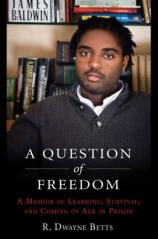A Question of Freedom: A Memoir of Learning, Survival, and Coming of Age in Prison
About the Book
A Question of Freedom: A Memoir of Learning, Survival, and Coming of Age in Prison
“I didn’t hear who said it, but it bounced off the old head’s ears. “Why you in here?” The old man kinda smiled his gap-toothed grin before he said, “Nah blood, you ain’t gotta worry ‘bout me. I’m ‘bout done living. You gots to find out why you in here” (p. 58).
Just before Christmas in 1996, two teenage boys carjacked a man outside a Virginia mall. In addition to a brief joyride in the stolen Grand Prix, their crime earned them ten dollars, a cell phone, and a credit card that would get them both arrested when they took it out on a shopping spree the next day. R. Dwayne Betts knew he’d made a mistake, but --- even after he began his eight-year prison term --- the sixteen-year-old honors student had no idea how high a price he would ultimately pay. Yet, the time Dwayne served also opened his eyes and taught him a series of hard-won lessons that would eventually lead him to freedom.
Dwayne was familiar with fear and violence well before his trial. But, behind bars, everyone “from lawyers to judges to the other kids around me thought their power rested in getting someone to fear you” (p. 7), and he began to wonder if he could endure prison’s constant threat of injury, rape, and even death without succumbing to the violence that originally landed him there. Fortunately for Dwayne, he reached beyond the black boys from his part of the world to make connections which --- however fleeting --- help him to preserve his humanity.
For the first time in his life, Dwayne lives in a racially mixed society. While the majority of prison inmates are black, some are Latino or white, and Dwayne realizes that his initial perceptions of them are based on stereotypes. Only when Droopy, an illegal Guatemalan gang member defends him from a black man, does Dwayne admit “it was ironic, I treated them the way I thought white people treated me” (p. 38). As they become friends, Dwayne decides to learn Spanish “to get rid of the expectation that they had to learn English and me, as an American, didn’t have to learn anything” (p. 42).
Prison also offers him the opportunity to forge relationships with older black men --- surprisingly, something the only son of a single mother had never done. Without offering it as an excuse for his crime, Dwayne writes, “the men in my family had disappeared before I was old enough to know they were missing” (p.9). Through fellow inmates like 62-year-old Pop Jenkins, Dwayne learns respect for the weight of experience and that “the truth is often in the space outside of the story” (p. 188).
However, throughout his incarceration, he finds the deepest solace with his most consistent companions: books. Certain volumes like The Black Poets anthology and Ernest Gaine’s A Lesson Before Dying resonate deeply with him, but he reads everything that comes his way. During difficult stretches, he burns through a book a day grappling to understand why he is in prison, how he will survive, and what he can possibly do afterwards if he did make it.
A Question of Freedom is at once a tour of the parallel universe occupied by black men in America, an exposé of the justice system’s grave shortcomings, and a morality tale. But, most of all, it is a beautifully, brutally honest memoir about one imprisoned boy’s harrowing journey towards freedom and manhood.
A Question of Freedom: A Memoir of Learning, Survival, and Coming of Age in Prison
- Publication Date: August 6, 2009
- Hardcover: 256 pages
- Publisher: Avery
- ISBN-10: 1583333487
- ISBN-13: 9781583333488



